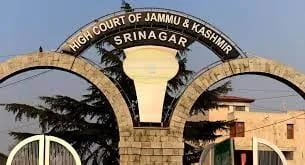Srinagar, Jul : Underscoring that they ceased to be citizens of India, the High Court of J&K and Ladakh has upheld the deportation of a married Pakistani couple who had been residing in Srinagar since 1988 on extended visas.
A bench of Justice Sindhu Sharma dismissed a plea by Muhammad Khalil Qazi and Arifa Qazi, husband and wife, filed in 1990 wherein they had sought the court’s intervention to declare their deportation as “illegal and unconstitutional” and not to deport them from the territory of J&K.
The details of the case divulged that originally born in Srinagar, Khalil in 1945 and Arifa in 1962. Khalil moved to Pakistan during the 1948 conflict and eventually became a Pakistani citizen.
The wife held an Indian passport, but after marrying him in Rawalpindi in 1986, she too became a Pakistani citizen, according to the details.
In July 1988, the couple entered India along with their minor son using Pakistani passports and valid Indian visas.
The CID issued residential permits, and their visas were extended three times, with the last extension valid until November 1, 1988.
After their permits expired, they submitted a representation to the government requesting that their Indian citizenship be resumed or granted.
As their request was under consideration, the Home Department issued a deportation order on September 13, 1989.
It was this deportation order that the couple challenged before the High Court in their plea.
In response to the plea, the court in its decision has noted that by voluntarily acquiring Pakistani citizenship, the couple lost their Indian citizenship in keeping with Section 9(1) of the Citizenship Act, 1955.
“Given Section 9(1), a citizen who voluntarily acquires citizenship of another country after commencement of the 1955 Act or between 26th January, 1950 and the date of commencement of the 1955 Act, upon such acquisition, such citizenship automatically ceases to be a citizen of India,” it said.
The court observed that Khalil Qazi ceased to be a citizen of India as he migrated to Pakistan and is a citizen of Pakistan, while Arifa Qazi has voluntarily acquired the citizenship of Pakistan after her marriage, and their son is a citizen of Pakistan by birth.
“Therefore, immediately upon acquiring the citizenship of Pakistan, they cease to be citizens of India,” the court said. “Thus, voluntary acquisition of citizenship of another country by an Indian citizen results in the termination of his Indian citizenship.”
The court said the petitioners have acted in their own volition and acquired the citizenship of a foreign country.
“Their passports and the residential permit issued in their favour are cogent, unequivocal evidence of the fact that the Petitioners are not citizens of India and, as such, orders to deport them were valid,” it said.
In response to the argument that a formal inquiry under Section 9(2) of the Citizenship Act should have been conducted to determine their citizenship status, the court said since the facts of the case were not in dispute, there was no need for such a formal procedure.
Dismissing their plea, the court observed that there was nothing on record to suggest that the request of the petitioners for the grant of citizenship of India had been accepted.
“They are staying in India on the strength of Pakistani passports, the period of which has expired, and after expiry of the extension of their stay, they had to return to their country,” it said.








